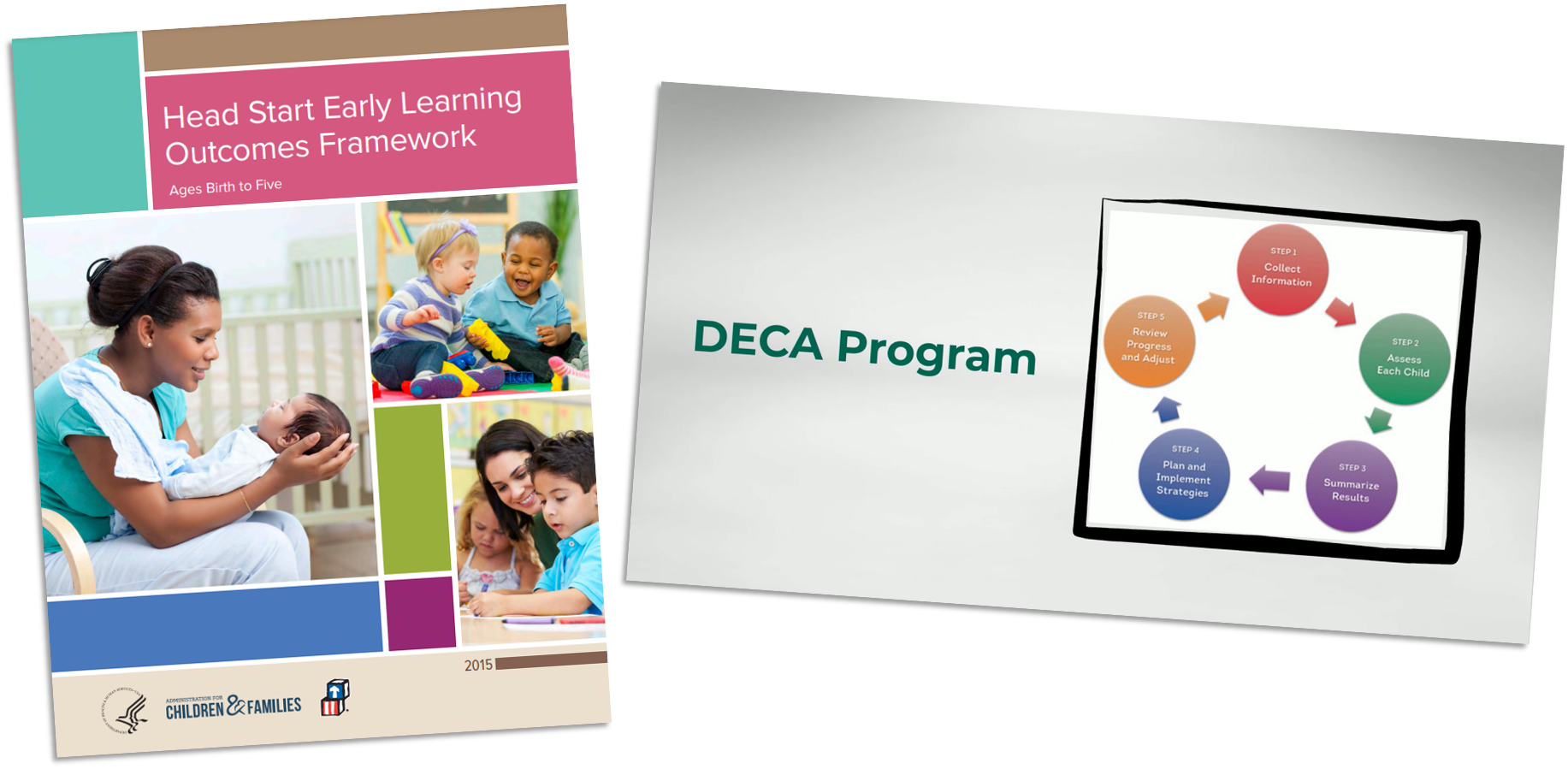October 9, 2023

The Head Start Early Learning Outcomes Framework: Ages Birth to Five (Framework) is designed to represent the continuum of learning for infants, toddlers and preschoolers. The Framework is grounded in a comprehensive body of research about what young children should know and be able to do to succeed in school and in life.
The Framework is intended to assist programs in their efforts to deliver high-quality early care and learning experiences and to guide programs in aligning their assessments, curricula, and professional development to school readiness goals. The Framework covers five broad Domains, broad areas of early learning and development from birth to 5 years. The Devereux Early Childhood Assessment (DECA) Program and two of those Domains, Social and Emotional Development and Approaches to Learning, strongly align.
The core of the DECA Program is the DECA, a nationally standardized, strength-based, reliable, and valid behavior rating scale that both teachers and parents can use to understand the social and emotional strengths and needs of young children. The DECA allows teachers and parents to reflect on how often a child engages in behaviors related to social and emotional development and resilience. The behaviors are organized into three areas, including:
- Attachment/Relationships: The child’s ability to promote and maintain mutual, positive connections with other children and significant adults
- Initiative: The child’s ability to use independent thought and action to meet his or her needs
- Self-Regulation: The child’s ability to express emotions and manage behaviors in healthy ways
It is our team’s hope that in using DECA Program resources, Head Start and Early Head Start programs can better meet the goals laid out under the Domains of Social and Emotional Development and Approaches to Learning. Let’s go through just some of those goals and how the DECA Program aligns well…
Infant/Toddler, Domain: Social and Emotional Development, Sub-domain: Relationships with adults
Sub-domain Goals
- Child develops expectations of consistent, positive interactions through secure relationships with familiar adults
- Child uses expectations learned through repeated experiences in primary relationships to develop relationships with other adults
- Child learns to use adults as a resource to meet needs
DECA Program Focus
- Attachment/Relationships: When children have reliable and trusting attachments to familiar adults, they look to those adults to meet their needs and are eventually then able to develop positive relationships with other adults.
- Initiative: Children who feel safe and securely attached to a familiar adult are able to engage in exploring their environment and learn new things.
- Self-Regulation: Children learn to express emotions when they have a secure relationships with familiar adults, and are able to look to that adult to help them regulate their strong emotions.
Preschool, Domain: Social and Emotional Development, Sub-domain: Emotional functioning
Sub-domain Goals
- Child expresses a broad range of emotions and recognizes these emotions in self and others
- Child expresses care and concern toward others
- Child manages emotions with increasing independence
DECA Program Focus
- Attachment/Relationships: Learning to recognize and name feelings and emotions helps children develop trust and learn to play well with others. Skills related to empathy also begin to develop as children (at the most basic level) can begin to think about how another person is feeling.
- Initiative: Children gain comfort when the adults that surround them provide them with a safe place to explore and express a variety of emotions. When young children learn to label how they feel, they can communicate more clearly and get their emotional needs met.
- Self-Regulation: After developing the ability to express and identify their emotions, children are then able to begin recognizing these feelings in others, making them more successful in peer situations as they begin to develop empathy and conflict management skills.
Infant/Toddler, Domain: Approaches to Learning, Sub-domain: Initiative and curiosity
Sub-domain Goals
- Child demonstrates emerging initiative in interactions, experiences, and explorations
- Child shows interest in and curiosity about objects, materials, or events
DECA Program Focus
- Attachment/Relationships: Children who have safe and trusting relationships with adults are more likely to freely explore their environments and initiate experiences that nurture their curiosity about how the world works.
- Initiative: Children who are curious and interested in experiences, materials and events are more able to take action and try new things and learn new things from those experiences.
- Self-Regulation: Children learn to self-regulate in the context of exploring objects and their environments with a supportive adult close by to encourage and redirect as needed.
Preschool, Domain: Approaches to Learning, Sub-domain: Cognitive self-regulation (executive functioning)
Sub-domain Goals
- Child demonstrates an increasing ability to control impulses
- Child maintains focus and sustains attention with minimal adult support
- Child persists in tasks
- Child holds information in mind and manipulates it to perform tasks
- Child demonstrates flexibility in thinking and behavior
DECA Program Focus
- Attachment/Relationships: Children are born with the potential to develop skills related to self-regulation and executive functioning. Adults can facilitate the development of a child’s executive function skills by establishing routines, modeling social behavior, and creating and maintaining supportive, reliable relationships.
- Initiative: Teachers can increase likelihood that children will be engaged in meaningful ways if the materials and activities provided are designed and selected based on the children’s unique interests, ability levels, and background.
- Self-Regulation: Children’s executive function and self-regulation skills grow at a fast pace during preschool, so it is important to adapt activities to match the skills of each child. Children are more likely to learn and to demonstrate appropriate behaviors when they are in a classroom where they are engaged and active.
For much more, we encourage you to check out and download our Head Start Early Learning Outcomes Framework & DECA Program Alignment Tool. We also encourage you to check out our webpage designed specifically for all of our Head Start and Early Head Start friends here.


